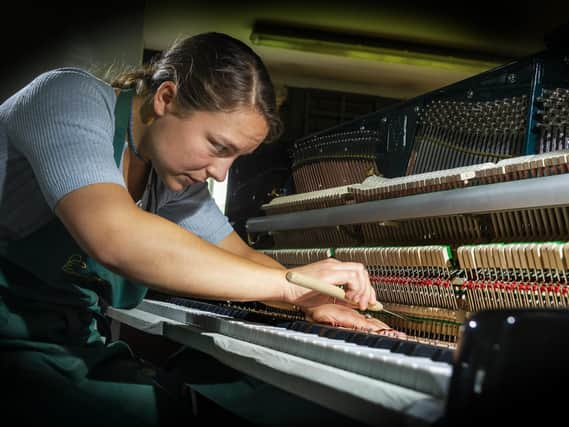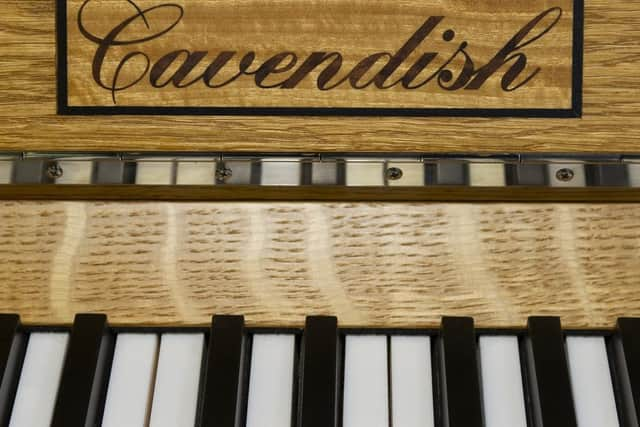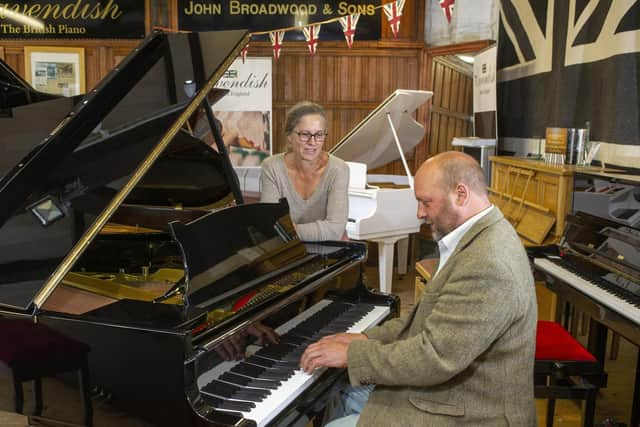Meet the UK’s only commercial manufacturer of traditional English pianos based near Bolton Abbey
This article contains affiliate links. We may earn a small commission on items purchased through this article, but that does not affect our editorial judgement.


In a report published last year, the craft of piano making in the UK was deemed to be critically endangered. The Heritage Crafts Association has what is called a Red List of Endangered Crafts and piano making is in danger of becoming extinct it warned, much like flute making, scissor making and horse collar making.
As it stands, there is only one company in the country that makes commercial, traditional pianos and that company is in a quiet, albeit breathtaking, corner of the Yorkshire Dales, at Bolton Abbey.
Advertisement
Hide AdAdvertisement
Hide AdCavendish Pianos has been up and running for seven years with Adam Cox running the company with his wife Charlie, its joint managing director. “I’ve always been interested in pianos,” he says. “I used to sit on my mother’s knee when she played and I used to like playing with the front off and watching all the hammers moving.”


This fascination with the mechanics of a piano led to Adam pursuing the instrument with more conviction. “Leeds College of Music did a course in piano technology and after that I started as a piano tuner and would get the odd one in to do up.”
Then the Coxs got some premises. Initially the company was based in Leeds and called Headingley Pianos. It was while they were running this that a new opportunity arose. “One day the rep from a company called Kemble came in,” Adam recalls. “They were the last British piano-making firm and they asked if we’d be interested in selling some of their new pianos.”
After a few years, Cox’s company had become the top seller of Kemble pianos in the UK. Yamaha then bought Kemble and within a year the Japanese giant had shut down the Milton Keynes factory, taking with it the last company in the UK to produce pianos. “It had broken a 200-year tradition of people building pianos in this country,” says Adam. “Plus, there were lots of people with all these skills and now nothing to do.”
Advertisement
Hide AdAdvertisement
Hide AdAdam decided to take action. “We felt we had no choice but to either lose British piano manufacturing forever, or try to resurrect the art of making pianos in Britain,” he says. “It was a now or never scenario.”


After about three years of research and development, Cavendish was launched at an exhibition in Frankfurt. Since then the company has continued to grow, as has its output. “We started small, producing a limited number of pianos in our first few years,” says Adam. “Now we’re producing about 40 pianos a year.”
This growth also required a new space, so they left their old Leeds showroom and made the move to Bolton Abbey, a place Adam discovered one day on a bike ride. “I knew immediately it was the right place for us as I peered through a window and saw a large barn of a room,” he remembers. “What acoustics, I thought.”
The Duke and Duchess of Devonshire were early supporters of the new local business and in return it was named after them in tribute. “They have backed our project every step of the way,” says Adam. “So we felt Cavendish was the perfect name for our pianos, given that it’s the Duke and Duchess’ family name.”
Advertisement
Hide AdAdvertisement
Hide AdOver the years the reputation of the pianos grew. Singer-songwriter Jamie Cullum is a fan and even included Cavendish on a BBC Radio 4 documentary he was making a few years back, swinging by to play and perform for locals on one of the pianos.
Not only are people responding to buying British-made pianos but there’s even a local sense of pride that Adam has picked up on. “Probably even more significant than buying British is the idea of buying Yorkshire,” he says. “A lot of people in Yorkshire love the idea of buying something that’s produced locally. They can also come and see the workshops and see the piano they have bought being built.
“We encourage people to come and take photographs during the build and sometimes people come with their kids and they will help a little bit by putting on a string or putting some keys on, or signing the bottom of a key in a secret place. Most pianos are made in these enormous factories and couldn’t be more unlike what we do – we try and add a personal touch.”
A personal touch is of course something that has been impossible in recent months, with everyone in lockdown. However, the company has actually noticed a spike in interest during this period. “We’ve been busy during lockdown,” Adam says. “I think people have had time to do the research online rather than just walk into a piano shop and because we’re the only British manufacturer, we’re the first thing that comes up when you look to buy pianos in this country.”
Advertisement
Hide AdAdvertisement
Hide AdDue to the conveyor belt-like system that Cavendish has, the average production time for a single piano is three months. However, because it is such a labour-intensive process, production hasn’t been stalled as people have been able to continue to work independently.
“Someone in Otley makes our case parts, our string maker is in Oxfordshire. We work with various people who’ve been involved in pianos all their life. We call it a craftsman’s co-operative,” says Adam.
So what makes a Cavendish piano unique aside from the fact it’s British? “The tone,” he says. “Chinese pianos are pretty bright but the traditional tone of English pianos is more soft and mellow. It’s a very warm sound and that’s what we produce. What we make is more of a sort of domestic piano – the English tradition of pianos is very well suited to domestic use.”
As for what makes that tone so distinct and unique, the answer is a rather long one. “I think we stopped counting when we got to about 100 different things,” adds Adam. “It’s everything from the length of the string to the tension of the string, and what the materials the strings are made out of. Virtually every part of the piano has some bearing on the final tone.”
Advertisement
Hide AdAdvertisement
Hide AdThe longer that Adam has been making pianos, the more his love for the instrument has grown. “They really are extraordinary things,” he says. “They contain more moving parts than any other instrument. People forget that it’s this very intricate machine made out of wood. There are not many other things like that that we encounter in our modern lives.”
Another attraction is the fact that they last such a long time. “People buy one and they’re buying with their grandchildren in mind – there’s no built-in obsolescence and all those kinds of terrible things that happen in modern manufacturing.”
As for what the future holds, Adam is happy with the way things are at present and doesn’t want to risk diluting the quality and consistency of his pianos. “I don’t think we will scale up,” he says. “I think we’ll stay pretty much the same. Small is beautiful. I don’t think we’d be any richer, or happier if we built more pianos and I think it’d be a riskier process. We’re pretty happy as we are.”
And as for that Red List of Endangered Crafts? Adam doesn’t have any issues there either. “We are quite a rare breed but I always say that we’re not the last piano maker in the UK, we’re the first of a new generation.”
www.cavendishpianos.com
Advertisement
Hide AdAdvertisement
Hide AdFor more stories from the YP Magazine and The Yorkshire Post features team, visit our Facebook page.
Editor’s note: first and foremost - and rarely have I written down these words with more sincerity - I hope this finds you well.
Almost certainly you are here because you value the quality and the integrity of the journalism produced by The Yorkshire Post’s journalists - almost all of which live alongside you in Yorkshire, spending the wages they earn with Yorkshire businesses - who last year took this title to the industry watchdog’s Most Trusted Newspaper in Britain accolade.
And that is why I must make an urgent request of you: as advertising revenue declines, your support becomes evermore crucial to the maintenance of the journalistic standards expected of The Yorkshire Post. If you can, safely, please buy a paper or take up a subscription. We want to continue to make you proud of Yorkshire’s National Newspaper but we are going to need your help.
Advertisement
Hide AdAdvertisement
Hide AdPostal subscription copies can be ordered by calling 0330 4030066 or by emailing [email protected]. Vouchers, to be exchanged at retail sales outlets - our newsagents need you, too - can be subscribed to by contacting subscriptions on 0330 1235950 or by visiting www.localsubsplus.co.uk where you should select The Yorkshire Post from the list of titles available.
If you want to help right now, download our tablet app from the App / Play Stores. Every contribution you make helps to provide this county with the best regional journalism in the country.
Sincerely. Thank you.
James Mitchinson